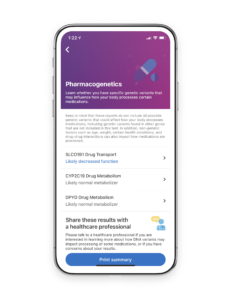Most of us have at least one genetic variant that may alter how our bodies process certain commonly prescribed medications. Yet, very few of us know about it.
That’s because genetic testing for these variants, also known as pharmacogenetic testing, is rare. But these genetic differences can impact how a person responds to certain prescribed medications.
CYP2C19 Drug Metabolism Medication Insights
This week 23andMe released two new Medication Insight reports* as part of our 23andMe+ Membership. The membership offers more than ten new reports and features throughout the calendar year giving members even deeper insights into their health. 23andMe remains the first and only direct-to-consumer company with FDA-authorized pharmacogenetic reports.
Our two new reports provide medication insights on how a person’s CYP2C19 metabolizer profile may impact citalopram and clopidogrel therapy. The reports look at clopidogrel, a blood thinner, and an antidepressant, citalopram. About 22 million people in the US are prescribed citalopram.[1] About 20 million have prescriptions for clopidogrel.[2] 23andMe’s FDA clearance of these new reports also removes the need for confirmatory testing in a clinical setting for specific CYP2C19 outcomes. The reports explicitly state that customers should consult their healthcare provider before making any changes to their medications.

The CYP2C19 gene provides the instructions for making the CYP2C19 enzyme, which helps the liver process (or “metabolize”) important medications. The enzyme also helps to process other medications such as over-the-counter treatments for acid reflux and ulcers, called proton pump inhibitors.
Last year 23andMe in collaboration with UCSF published research confirming just how common some of these variants are. Our research indicates that for about 30 percent of our customers, clopidogrel will be “likely less effective.” For East Asian and South Asian customers, it’s more than half who’ll see that result. About 3 percent of customers have an “increased chance of side effects” result for citalopram. Among East Asians and South Asians the percentage is between 10 percent and 12 percent.
Actionable Results
These new reports are part of 23andMe’s larger offering of Pharmacogenetic Reports* on three genes that impact a total of 11 medications. Together they offer 23andMe+ members a new class of reports, giving them deeper insight into their health. The results are among the most highly actionable genetic reports consumers can receive.
It has long been known that genetics influences why people respond differently to certain medications. But it is very rare for people to learn about those differences before they’ve already been prescribed a medication.
The study by researchers from 23andMe in collaboration with UCSF found that the majority of people have at least one genetic variant in the CYP2C19 gene that impacts how the body processes certain medications, including clopidogrel and citalopram. Earlier this year, a meta-analysis showed that patients with loss-of-function variants in the CYP2C19 gene had a 30 percent reduction in ischemic events — including heart attacks and strokes — when treated with alternative antiplatelet medications, including ticagrelor or prasugrel, versus clopidogrel.
Our own research indicates that 70 percent of 23andMe customers would receive a potentially actionable result from our pharmacogenetic reports.[3]
Knowledge is Power
When it comes to medicines, we know that one size doesn’t necessarily fit all. Different people may respond differently to the same medicine due to factors like their age, weight, liver and kidney function, diet, or even other medicines they might be taking.
And we also know that for many medications, genetic factors also play an important role. Through our research and through the work of other scientists we’ve learned how common it is for people to have genetic variants that affect how we metabolize certain medicines. People could potentially benefit from knowing that they metabolize some medications differently than others.
23andMe’s Pharmacogenetic Reports offer consumers a chance to learn about these differences, and then to share that information with their healthcare provider so that they are better able to prescribe the right medicine at the right dose. Customers should not use their results to start, stop or change their medications without first consulting their healthcare provider.
If you are not yet a 23andMe+ member you can find out more here.
References:
[2] Ibid.
Note:
*23andMe PGS Pharmacogenetic reports: The 23andMe test uses qualitative genotyping to detect 3 variants in the CYP2C19 gene, 2 variants in the DPYD gene and 1 variant in the SLCO1B1 gene in the genomic DNA of adults from saliva for the purpose of reporting and interpreting information about the processing of certain therapeutics to inform discussions with a healthcare professional. It does not describe if a person will or will not respond to a particular therapeutic and does not describe the association between detected variants and any specific therapeutic. Our CYP2C19 Pharmacogenetic report provides certain information about variants associated with metabolism of some therapeutics and provides interpretive drug information regarding the potential effect of citalopram and clopidogrel therapy. Results for SLCO1B1 and DPYD and certain CYP2C19 results should be confirmed by an independent genetic test prescribed by your own healthcare provider before taking any medical action.
Warning:
Test information should not be used to start, stop, or change any course of treatment and does not test for all possible variants that may affect metabolism or protein function. The PGS test is not a substitute for visits to a healthcare professional. Making changes to your current regimen can lead to harmful side effects or reduced intended benefits of your medication, therefore consult with your healthcare professional before taking any medical action. For important information and limitations regarding Pharmacogentic reports, visit www.23andme.com/test-info.